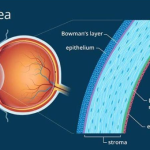The eyes are a window to the soul, and they can also provide important clues to the presence of systemic infections. Many infections can cause ocular manifestations, which are changes in the eyes that can be seen during a physical exam. Ocular manifestations can vary depending on the type of infection and the severity of the disease. In this blog, we will discuss some of the most common ocular manifestations of systemic infections.
In this blog, we will explore some of the most common systemic infections that can affect the eyes and their ocular manifestations.
Viral Infections
Some of the most common viruses that can cause ocular manifestations include herpes simplex virus (HSV), varicella-zoster virus (VZV), and cytomegalovirus (CMV). These viruses can cause a range of eye problems, such as conjunctivitis (pink eye), keratitis (corneal inflammation), and uveitis (inflammation of the middle layer of the eye). HSV keratitis is the most common cause of infectious corneal blindness in developed countries.
Herpes Simplex Virus (HSV): HSV can cause a variety of ocular manifestations, including conjunctivitis, keratitis, and uveitis. HSV keratitis is the most common cause of infectious corneal blindness in developed countries.
Varicella-Zoster Virus (VZV): VZV can cause ocular manifestations such as conjunctivitis, uveitis, and keratitis. VZV keratitis can cause severe corneal scarring and vision loss.
Cytomegalovirus (CMV): CMV can cause retinitis, a serious inflammation of the retina that can lead to blindness.
Bacterial Infections
Streptococcus pneumoniae, Neisseria gonorrhoeae, and Chlamydia trachomatis are some of the bacteria that can cause ocular manifestations. Pneumococcal conjunctivitis is a common ocular manifestation of pneumococcal infection, while gonococcal conjunctivitis is a rare but serious ocular manifestation of gonococcal infection. Trachoma, caused by C. trachomatis, is a chronic bacterial infection that can lead to blindness if left untreated.
Streptococcus pneumoniae: Pneumococcal conjunctivitis is a common ocular manifestation of pneumococcal infection.
Neisseria gonorrhoeae: Gonococcal conjunctivitis is a rare but serious ocular manifestation of gonococcal infection. It can cause corneal perforation and blindness if not treated promptly.
Chlamydia trachomatis: Trachoma is a chronic bacterial infection caused by C. trachomatis that can cause blindness if left untreated.
Fungal Infections
Candida, Aspergillus, and Cryptococcus are some of the fungi that can infect the eyes. Fungal keratitis, a serious infection of the cornea, is a common ocular manifestation of Aspergillus infection. Candida can cause endophthalmitis, a serious inflammation of the inner eye that can lead to vision loss. Cryptococcal infection can cause a variety of ocular manifestations, including uveitis, retinitis, and endophthalmitis.
Candida: Candida can cause endophthalmitis, a serious inflammation of the inner eye that can lead to vision loss.
Aspergillus: Aspergillus can cause fungal keratitis, a serious infection of the cornea that can lead to corneal scarring and vision loss.
Cryptococcus: Cryptococcal infection can cause a variety of ocular manifestations, including uveitis, retinitis, and endophthalmitis.
Parasitic Infections
Toxoplasma gondii, Onchocerca volvulus, and Loa loa are some of the parasites that can cause ocular manifestations. Toxoplasmosis can cause chorioretinitis, a serious inflammation of the choroid and retina that can lead to vision loss. Onchocerciasis, also known as river blindness, is caused by the parasitic worm O. volvulus and can cause blindness if left untreated. Loiasis, caused by the parasitic worm L. loa, can cause serious ocular manifestations, including conjunctivitis, keratitis, and uveitis.
Toxoplasma gondii: Toxoplasmosis can cause chorioretinitis, a serious inflammation of the choroid and retina that can lead to vision loss.
Onchocerca volvulus: Onchocerciasis, also known as river blindness, is caused by the parasitic worm O. volvulus. It can cause blindness if left untreated.
Loa loa: Loiasis, also known as African eye worm, is caused by the parasitic worm L. loa. It can cause serious ocular manifestations, including conjunctivitis, keratitis, and uveitis
In conclusion, systemic infections can cause a variety of ocular manifestations that can range from mild to severe. It is important to seek medical attention if you experience any changes in your vision or eye symptoms, especially if they are associated with other systemic symptoms such as fever, chills, or swollen lymph nodes. Early diagnosis and treatment of ocular manifestations can prevent permanent vision loss and improve overall outcomes.
Infections that start elsewhere in the body can sometimes affect the eyes, causing various ocular manifestations. These infections can be caused by viruses, bacteria, fungi, and parasites, and the specific ocular manifestations depend on the type and severity of the infection. Ocular manifestations can range from minor irritation to serious vision loss, so it’s important to seek medical attention if you notice any changes in your vision or if your eyes are bothering you. Early diagnosis and treatment can prevent permanent vision loss and improve overall outcomes.









